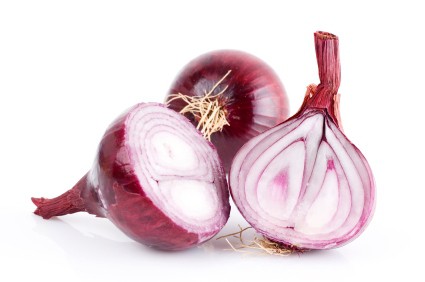
Nutritional Benefits of Onions
By Jill Weisenberger, MS, RD, CDE
This relative of the lily offers low-calorie, fat-free flavor and a helping of health boosters. One cup of raw onions contains 64 calories and is a good source of fiber and vitamin C.
Research suggests that white fruits and vegetables may help protect against stroke, while the allium family (onions, garlic, leeks, chives and scallions) may help reduce the risk of stomach cancer. Epidemiological studies suggest that onions may also protect against other GI cancers such as oral, laryngeal, esophageal and colorectal cancers. Scientists are digging up health effects of the onion’s prebiotics, too. Fructose polymers called fructans may help improve bowel function, boost immunity and improve mineral absorption. Individuals with irritable bowel syndrome or other bowel disease, however, may be prone to gastrointestinal discomfort and gas from fructans.
Cooking With Onions
By Lanier Dabruzzi, MS, RD
Julia Child once said, “It’s hard to imagine civilization without onions,” and with the onion’s many flavors, colors and applications, it’s a statement that’s difficult to dispute. From entrees to cocktails, onions pervade our culinary landscape. Yellow, white and red are the most common types of onions in the U.S., and many others punctuate recipes, such as scallions and pearl onions. Onion flavor can range from sweet to sharp, depending on the type of onion, season of growth and preparation method. For a caramel flavor and color (perfect for a sweet and savory flatbread or decadent quiche), sauté onions over a low to medium flame. If the heat is too high, a bitter taste will develop. For raw onion that brightens your tacos or chili, place cut onions in ice water for 1½ hours to decrease the pungency.
To avoid tearing up at the chopping board, refrigerate the whole onion for 30 minutes prior to use. When it’s time to slice or dice, leave the root end intact because it contains the highest concentration of those tear-causing sulfuric compounds. Once cut, onions can be stored in the refrigerator for up to 10 days.
Using Onions in Food Service
By Garrett Berdan, RD
Onions are foundational in the savory kitchen and are often the first ingredient into the pan. Raw or cooked, their versatility adds to the many layers of flavor to make a perfect dish. Yellow onions are an all-purpose cooking onion and the best choice for caramelizing. Red onions are great for grilling, broiling or roasting, while raw white onions can be sprinkled over chili or used in fresh salsa. There are notable seasonal differences as well: Spring/summer onions (which include sweet onions such as Vidalia) are ideal to serve fresh, lightly cooked or grilled, while the more pungent fall/winter onions are best for long-cooking dishes such as soups, stews and braises.
During spring and summer, order smaller quantities of dry onions more frequently. Due to higher water content, spring/summer onions have a shelf life of 30 to 60 days, whereas the lower water content of fall/winter onions means they can be stored for 30 to 180 days. Dry onions should be stored away from other produce in a cool (45°–55° F), dark and dry location with good air circulation. Onions for foodservice range in diameter from boilers (1 to 1 7⁄8 inch) to super colossal (4½ inches and larger). Pre-cut onions are available both “fresh processed” and “individually quick frozen,” or IQF. Fresh processed onions may be purchased whole peeled, whole sliced, diced, rings, stir-fry (wide julienne) or slivered (thin julienne). IQF onions are available diced, in strips or rings.











